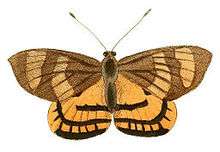Ceretes thais
| Ceretes thais | |
|---|---|
 | |
| Illustration by Dru Drury | |
| Scientific classification | |
| Kingdom: | Animalia |
| Phylum: | Arthropoda |
| Class: | Insecta |
| Order: | Lepidoptera |
| Family: | Castniidae |
| Genus: | Ceretes |
| Species: | C. thais |
| Binomial name | |
| Ceretes thais (Drury, 1782)[1] | |
| Synonyms | |
| |
Ceretes thais is a moth in the Castniidae family. It is found in Brazil. Superficially it looks very like a butterfly, and was originally placed by Dru Drury in the "Papilio (Danaus Festivus)" group which mostly corresponds with modern Nymphalidae.
Description
Upper side: Antennae brown. Thorax, abdomen, and anterior wings red brown; the latter having two streaks or bars of a lighter colour crossing them from the anterior edges to the posterior and external ones; one crossing the middle of the wing, the other nearer the tips. Posterior wings orange; the lower part black along the external edge, whereon are placed a row of square orange coloured spots, those next the upper corners reaching to the edge; a black line also crosses these wings, beginning just below the body, and running almost across to the upper corner.
Under side: Palpi and thorax red-brown. Abdomen yellowish. Anterior wings yellowish clay coloured, with three black lines crossing them transversely, the middle one being the broadest. Posterior wings orange brown, with a small white spot placed near the centre. Margins of the wings plain. Wing-span 2 1⁄2 inches (64 mm).[2]
References
- ↑ Ceretes at funet
- ↑ Drury, Dru (1837). Westwood, John, ed. Illustrations of Exotic Entomology. 3. pp. 22-23. pl. XVI.
| Wikispecies has information related to: Ceretes thais |
| Wikimedia Commons has media related to Ceretes thais. |